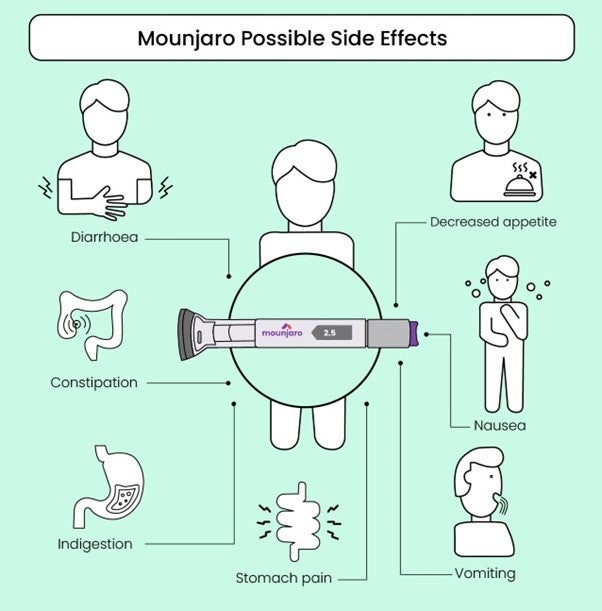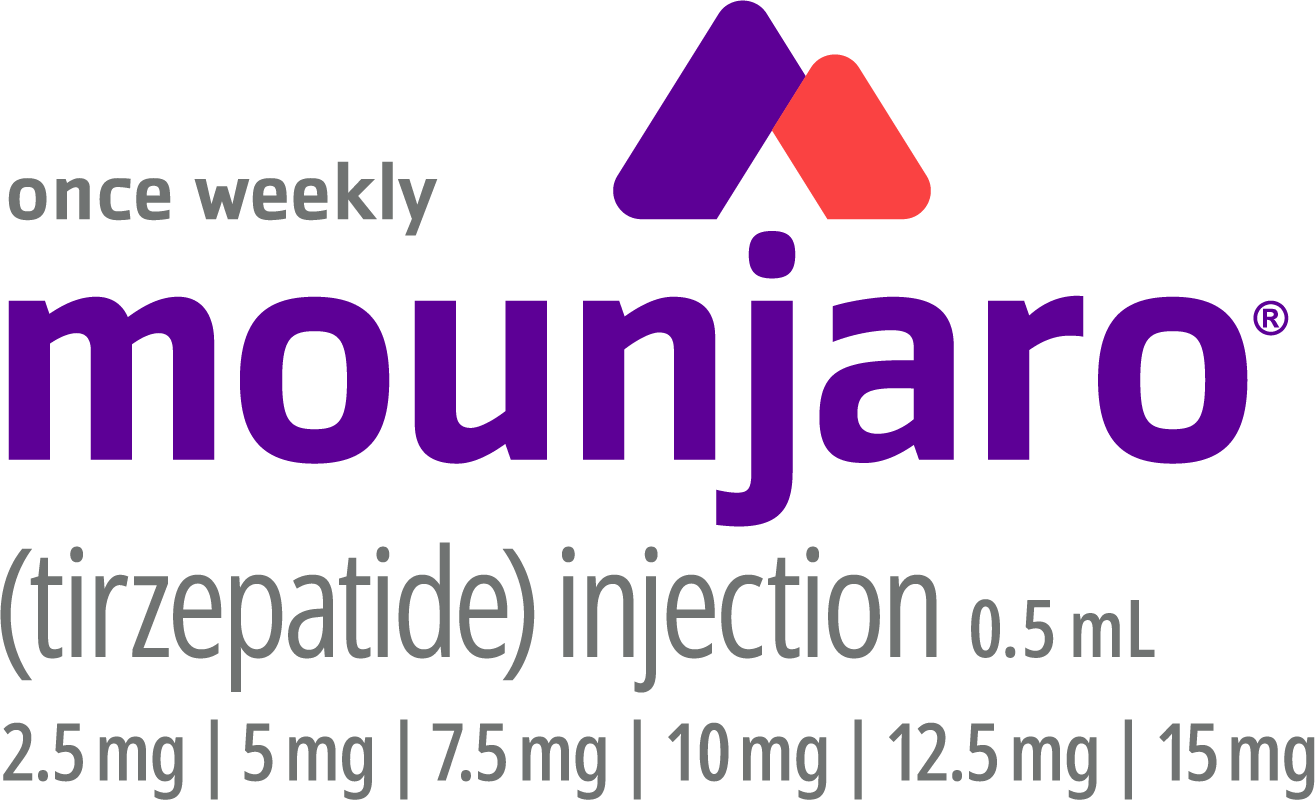Mounjaro, a groundbreaking medication from Eli Lilly and Company, has been making waves in the treatment of type 2 diabetes mellitus and weight management. Containing the active ingredient tirzepatide, Mounjaro has shown promise in reducing blood sugar levels and aiding in weight loss. However, like all medications, it comes with its own set of potential side effects. This blog aims to delve into these side effects, offering readers an informed perspective based on the updated patient leaflet as of 23rd February 2023.
Overview of Mounjaro
Mounjaro's versatility in managing type 2 diabetes and facilitating weight loss stems from its ability to regulate appetite, promoting a sense of fullness and reducing food cravings. This dual-action treatment is available in varying strengths, from 2.5 mg to 15 mg, catering to individual needs and ensuring tailored treatment plans.
Side Effects: What You Need to Know

While Mounjaro presents a promising solution for many, understanding its potential side effects is crucial for patients and healthcare providers alike. Here's what you should be aware of:
Serious Side Effects of Mounjaro
Uncommon Yet Important Concerns
- Acute Pancreatitis: This condition, characterised by inflamed pancreas, manifests as severe pain in the stomach and back—a pain that persistently lingers. Its occurrence is uncommon, affecting up to 1 in 100 individuals. The nature of this pain, due to its intensity and potential complications, requires immediate medical attention. If you find yourself or someone you know experiencing these symptoms while on Mounjaro, it's imperative to consult a healthcare professional without delay.
Rarer, Yet Critical Reactions
- Severe Allergic Reactions: Even more rare, yet significantly critical, are the severe allergic reactions to Mounjaro. These reactions, which may affect up to 1 in 1,000 people, can include anaphylactic reactions and angioedema. The symptoms to watch out for encompass breathing difficulties, rapid swelling of the lips, tongue, and/or throat, trouble swallowing, and a swift heartbeat. Such reactions demand immediate medical intervention. Notifying your doctor as soon as these symptoms are noticed is crucial for prompt and effective treatment.

Read more: Mounjaro vs Wegovy: A Detailed Comparison of Two Drugs
Other Side Effects
Very Common Side Effects
Hypoglycemia: A Key Concern
- Low Blood Sugar (Hypoglycemia): Particularly prevalent when Mounjaro is combined with sulphonylureas or insulin, hypoglycemia stands out as a very common side effect. The symptoms, ranging from headache and drowsiness to confusion and fast heartbeat, necessitate vigilant monitoring. It's imperative to adjust dosages under medical guidance to mitigate this risk. Your healthcare provider should offer strategies to manage low blood sugar effectively.
Gastrointestinal Side Effects
- Feeling Sick (Nausea) and Diarrhoea: These side effects are often most pronounced at the onset of treatment with Mounjaro but tend to decrease over time. They are not typically severe but can be discomforting.
- Being Sick (Vomiting) and Constipation: For individuals utilising Mounjaro for weight management, vomiting and constipation may be particularly prevalent, though they are also common in the treatment of type 2 diabetes. These side effects usually become less intense as the body adjusts to the medication.
Common Side Effects
Blood Sugar Monitoring
- Low Blood Sugar (Hypoglycemia) with Metformin: Particularly when Mounjaro is used alongside metformin and a sodium-glucose co-transporter 2 inhibitor, monitoring for symptoms of low blood sugar is crucial. These symptoms can range from headache and drowsiness to confusion and fast heartbeat. Regular monitoring and having a plan in place for managing low blood sugar, as advised by your healthcare provider, are key steps in mitigating this risk.
Allergic Reactions and Sensitivities
- Allergic Reactions: While less common, allergic reactions such as rash, itching, and eczema can occur. Being vigilant for these signs and consulting your doctor if they arise ensures prompt and appropriate management.
Effects on Blood Pressure and Heart Rate
- Dizziness and Low Blood Pressure: Noted particularly in patients undergoing weight management, these side effects warrant monitoring and adjustment of treatment as necessary. Staying hydrated and slowly transitioning from sitting to standing can help manage dizziness, while consulting with your healthcare provider is important for addressing low blood pressure.
- Fast Pulse: A fast pulse, more common in those treated for type 2 diabetes, should be monitored. Regular check-ins with your healthcare provider can help manage this side effect effectively.
Gastrointestinal and Appetite Changes
- Changes in Appetite, Stomach Pain, and Digestive Issues: Mounjaro can lead to decreased appetite, abdominal pain, indigestion, bloating, burping, gas, and symptoms of reflux or heartburn. Managing diet, meal timing, and food choices can alleviate some of these symptoms. If they persist, it's important to discuss them with your healthcare provider.
- Hair Loss: Though less common, hair loss has been observed in some patients. Discussing this with your healthcare provider can provide strategies for managing and potentially mitigating this effect.
Injection Site Reactions
- Reactions at the Injection Site: Some patients may experience itching or redness at the injection site. Practising proper injection techniques and rotating sites can help minimise these reactions.
Monitoring Pancreatic Enzymes
- Pancreatic Enzymes: An increase in pancreatic enzymes, such as lipase and amylase, can occur. While less common, monitoring these levels through regular blood tests as recommended by your healthcare provider is important for early detection and management.
Uncommon Side Effects
Gallstones and Cholecystitis
- Gallstones: The development of gallstones is an uncommon side effect. Monitoring for symptoms such as abdominal pain, nausea, and vomiting is important.
- Cholecystitis: Similarly, cholecystitis, or infection of the gallbladder, presents a rare risk, particularly noted in patients using Mounjaro for weight management. Symptoms mirroring gallstones, along with fever, should prompt immediate medical consultation.
Weight Management Effects
- Weight Loss: While weight loss is often a desired outcome for those treated for type 2 diabetes with Mounjaro, significant or unexpected weight loss should be monitored and discussed with healthcare providers to ensure it's within a healthy range.
Increased Calcitonin Levels
- Increased Calcitonin Levels in Blood: An increase in calcitonin levels, detected through blood tests, is another uncommon side effect. While the implications vary, monitoring these levels can be part of ongoing health assessments.
Customers are strongly encouraged to consult the detailed patient information leaflet available at https://www.medicines.org.uk/emc/product/14206/pil. This website hosts the electronic Medicines Compendium (eMC), which provides free access to the latest approved information about medicines licensed for use in the UK. The patient information leaflet (PIL) for Mounjaro available on this site contains vital details that can help you understand:
- How to correctly use Mounjaro
- Detailed information on potential side effects
- Advice on managing side effects
- Warnings and precautions
- Information about the composition of Mounjaro and its available dosages
How Long Does Mounjaro Side Effects Last
The duration of side effects from Mounjaro (tirzepatide) can vary based on the type of side effect experienced. Common side effects, such as gastrointestinal issues including nausea, diarrhoea, decreased appetite, vomiting, constipation, dyspepsia, and abdominal pain, often occur when initiating treatment. These symptoms may worsen during the first few weeks or months as the dose is increased but should start to lessen once the optimal dose is established. Typically, these common side effects go away within a few days or weeks after initiating therapy or following dose adjustments, or once the body has adjusted to the medicine. More serious side effects, like kidney problems, thyroid tumours, or pancreatitis, may require the discontinuation of Mounjaro.
It's important to discuss any side effects with a healthcare provider, as they can provide guidance on how to manage them and whether any action needs to be taken. Additionally, for the most effective management and mitigation of side effects, following the prescribed usage instructions and communicating openly with your healthcare provider about your health history and any concerns is crucial.
Tips for Managing Side Effects
- Stay Hydrated: To combat gastrointestinal side effects and avoid dehydration, maintaining fluid intake is essential.
- Monitor Blood Sugar Levels: Especially important for those on additional diabetes medications; monitoring helps prevent hypoglycemia.
- Consult Healthcare Providers: At the first sign of severe side effects or allergic reactions, seeking medical advice is imperative.
Read more: Switching from Wegovy to Mounjaro: How To Guide for Patients
Reporting Side Effects
Contributing to the safety profile of Mounjaro by reporting any side effects to healthcare authorities is an important step. In the UK, this can be done via the MHRA Yellow Card Scheme.
Conclusion
Mounjaro represents a significant advancement in treating type 2 diabetes and managing weight loss. However, being well-informed about its potential side effects, taking preventative measures, and maintaining open communication with healthcare providers are key to optimising treatment outcomes and ensuring patient safety. As always, individual consultation with healthcare professionals is paramount to address personal health needs and concerns.



